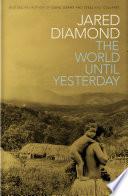Works
Collapse: How Societies Choose to Fail or Succeed
Jared DiamondGuns, Germs, and Steel
Jared Diamond
The World Until Yesterday
Jared Diamond
The Third Chimpanzee
Jared DiamondFamous Jared Diamond Quotes
“Much of human history has consisted of unequal conflicts between the haves and the have-nots.”
Source: Guns, Germs, and Steel: The Fates of Human Societies
Source: Guns, Germs, and Steel: The Fates of Human Societies
Cited by Tim Flannery, "Learning from the past to change our future" http://science.sciencemag.org/content/307/5706/45.full, Science, volume 307, 7 January 2005, page 45.
Source: Collapse: How Societies Choose to Fail or Succeed (2005)
Source: Why Is Sex Fun? The Evolution of Human Sexuality
Source: Guns, Germs and Steel: The Fates of Human Societies
Jared Diamond Quotes about history
Source: Guns, Germs, and Steel: The Fates of Human Societies
Page 349
Collapse: How Societies Choose to Fail or Succeed (2005)
Source: Collapse: How Societies Choose to Fail or Succeed (2005), Chapter "Big businesses and the environment: different conditions, different outcomes", section "Businesses and the public" (Penguin Books, 2011, pages 484-485, ISBN 978-0-241-95868-1.
Source: Collapse: How Societies Choose to Fail or Succeed (2005), Chapter "The world as a polder: what does it all mean to us today?", section "If we don't solve them..." (Penguin Books, 2011, page 498, ISBN 978-0-241-95868-1.
Source: Guns, Germs, and Steel: The Fates of Human Societies (1997), p. 357
Source: Guns, Germs, and Steel: The Fates of Human Societies (1997), p. 241
Jared Diamond Quotes about people
Source: Collapse: How Societies Choose to Fail or Succeed (2005), Chapter "The world as a polder: what does it all mean to us today?", section "Reasons for hope" (Penguin Books, 2011, page 525, ISBN 978-0-241-95868-1.
Source: Collapse: How Societies Choose to Fail or Succeed (2005), Chapter "The world as a polder: what does it all mean to us today?", section "Reasons for hope" (Penguin Books, 2011, page 521, .
Page 498
Collapse: How Societies Choose to Fail or Succeed (2005)
Prologue, section "Why study traditional societies?"
The World Until Yesterday: What Can We Learn from Traditional Societies? (2012)
Jared Diamond Quotes
Source: Collapse: How Societies Choose to Fail or Succeed (2005), Chapter "Why do some societies make disastrous decisions", section "Disastrous values" (Penguin Books, 2011, pages 432-433, ISBN 978-0-241-95868-1.
Source: Collapse: How Societies Choose to Fail or Succeed (2005), Chapter "The world as a polder: what does it all mean to us today?", section "Reasons for hope" (Penguin Books, 2011, pages 521-522, ISBN 978-0-241-95868-1.
Source: Collapse: How Societies Choose to Fail or Succeed (2005), Chapter "The world as a polder: what does it all mean to us today?", section "One-liner objections" (Penguin Books, 2011, page 509, ISBN 978-0-241-95868-1.
About global warming. Chapter "The world as a polder: what does it all mean to us today?", section "The most serious problems" (Penguin Books, 2011, page 493, ISBN 978-0-241-95868-1.
Collapse: How Societies Choose to Fail or Succeed (2005)
Source: Guns, Germs, and Steel: The Fates of Human Societies (1997), p. 200
“Remember that impact is the product of two factors: population multiplied times impact per person.”
Source: Collapse: How Societies Choose to Fail or Succeed (2005), Chapter "The world as a polder: what does it all mean to us today?", section "Reasons for hope" (Penguin Books, 2011, page 524, ISBN 978-0-241-95868-1.
Source: Collapse: How Societies Choose to Fail or Succeed (2005), Chapter "Big businesses and the environment: different conditions, different outcomes", section "Businesses and the public" (Penguin Books, 2011, page 485, ISBN 978-0-241-95868-1.
“Put another way, the chimpanzees' closest relative is not the gorilla but humans.”
The Third Chimpanzee (1991)
The Third Chimpanzee: The Evolution and Future of the Human Animal (1991)
Prologue, section "Why study traditional societies?"
The World Until Yesterday: What Can We Learn from Traditional Societies? (2012)
On the fates of past societies facing problems of sustainability, page 522
Collapse: How Societies Choose to Fail or Succeed (2005)
Epilogue
The World Until Yesterday: What Can We Learn from Traditional Societies? (2012)
Source: Collapse: How Societies Choose to Fail or Succeed (2005), Chapter "The world as a polder: what does it all mean to us today?", section "One-liner objections" (Penguin Books, 2011, page 503, .
The Third Chimpanzee (1991)
The Third Chimpanzee: The Evolution and Future of the Human Animal (1991)
Source: Collapse: How Societies Choose to Fail or Succeed (2005), Chapter "The world as a polder: what does it all mean to us today?", section "Reasons for hope" (Penguin Books, 2011, pages 522-523, ISBN 978-0-241-95868-1.
Source: Guns, Germs, and Steel: The Fates of Human Societies (1997), p. 424
Source: Guns, Germs, and Steel: The Fates of Human Societies (1997), p. 408
